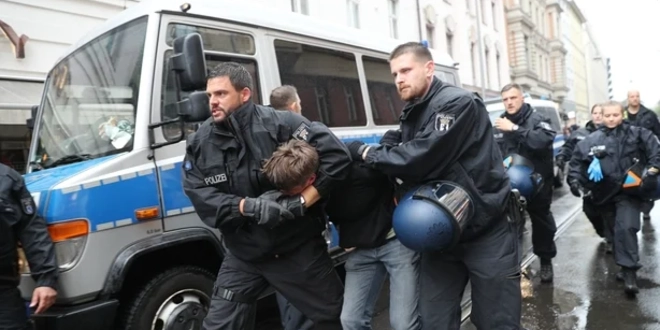The Irish ambassador to Germany has raised concerns with Berlin authorities after an Irish citizen, Kitty O’Brien, was injured during a pro-Palestine demonstration in the German capital. Footage shared widely on social media showed O’Brien being struck in the face by a police officer before being dragged away from the protest on Rosenthaler Street last Thursday.
Ireland’s Department of Foreign Affairs confirmed that Ambassador Maeve Collins, along with senior officials, had contacted German authorities regarding the incident. The department said it “stands ready to provide consular assistance to the citizen concerned, should they request it.”
Injuries and Allegations of Excessive Force
According to Irish Bloc Berlin, the activist group with which O’Brien is affiliated, the protester sustained a serious arm injury when police “pulled and twisted with great force” their right arm, breaking the bone. O’Brien was later admitted to Berlin’s Charité hospital, where they underwent surgery for the injury.
The group claimed officers “showed no concern” for O’Brien’s condition, accusing police of responding with “one-sided violence.” They also noted that O’Brien had previously been targeted by Berlin police on two occasions, including during a Nakba Day demonstration and another protest outside the Irish embassy earlier this year.
The Irish Palestine Solidarity Campaign described the Berlin police response as “indefensible,” calling it part of “a shameful pattern of brutal attacks on peaceful Palestine protestors.”
Berlin Police Response
Berlin Police issued a statement confirming that the incident has been referred to the Directorate for Police Offenses, an oversight body, to determine whether officers acted disproportionately or committed criminal misconduct.
Authorities defended their response, claiming O’Brien had refused repeated orders to leave what they described as an “unauthorized gathering” and had “verbally insulted and physically offended” officers. Police said they were “compelled to use immediate force, including targeted strikes, to overcome resistance and carry out the arrest.”
The statement also alleged that O’Brien themselves suggested they might be “punched in the face” and continued to defy orders to disperse. Around 100 demonstrators were reportedly told to leave the protest site, and officials said expulsions “had to be enforced by emergency services, sometimes by force.”
Berlin Police added that 96 criminal investigations were opened following the protest, including for alleged use of symbols linked to banned organizations, resisting arrest, assaulting officers, and unauthorized residence. All individuals detained were released after their identities were confirmed.
Irish Political Reaction
Back in Ireland, the incident has drawn sharp political criticism. Labour TD Duncan Smith said he had contacted Tánaiste Micheál Martin to raise “deep concern” and to press for an explanation from Germany. Sinn Féin also condemned the events, stressing that “highlighting the ongoing devastation and slaughter of civilians in Gaza is not a crime.”
Protest in Dublin
In response, supporters of O’Brien gathered outside the German Embassy in Dublin to denounce the treatment of the activist. Among them was O’Brien’s aunt, Dublin City Councillor Catherine Stocker, who said:
“Kitty’s arm has been broken, they have nerve damage, and their nose has been smashed. What you see here is young Irish people standing up for international law and for Gaza, which in Berlin has effectively been made illegal to do.”
She urged the Irish government to take a stronger stance, arguing it was “completely outside the bounds of democratic practice to treat people peacefully protesting a genocide in this way.”
Other speakers, including Lydia Bigley from Queers for Palestine, criticized Berlin authorities, highlighting that the city has long been a hub of protest culture. “It wasn’t like this before the recent outbreak of violence in Gaza,” she said, expressing shock at what she described as escalating police repression.
Wider Context
The incident comes amid heightened tensions in Germany over demonstrations linked to the war in Gaza. German authorities have introduced tighter restrictions on pro-Palestinian gatherings in recent months, citing security concerns, but activists and rights groups argue these measures suppress legitimate protest and free expression.
For Ireland, the case not only touches on consular and diplomatic obligations but also reflects broader divisions within Europe over how to handle solidarity demonstrations linked to the Israel–Palestine conflict.
 The Daily Star Ireland
The Daily Star Ireland

